Physical Therapy and Exercise for the Knee
You may be prescribed a number of physical therapy exercises. Physical therapy is simply an exercise program that gently stretches and strengthens specific muscles and joints. The exercises you may perform are gentle range of motion (stretching) exercises designed to restore movement and strength to your joint and to promote blood flow for healing.
It is important to stay proactive in your physical therapy since it can have a direct impact on the total outcome of your surgery. Remember to stay diligent and don’t give up. Ask for help if you need it. Friends, family members, and even neighbors can be helpful during your recovery, especially if you ask for their assistance before your surgery.
Physical therapy is a very important role in the recovery process. A physical therapist may demonstrate a variety of low-impact exercises designed to increase the strength and mobility of your shoulder joint. However, you should only perform the exercises that are ordered by your surgeon.
The following are examples of exercises that your surgeon may prescribe.
ONLY PERFORM THE EXERCISES PRESCRIBED BY YOUR DOCTOR
Knee Physical Therapy Exercises
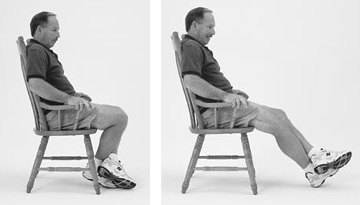
1. Knee Flexion: Seated Stretch
The knee flexion/ seated stretch is performed while seated in a chair. Gently slide your surgical leg behind you while keeping your foot flat against the ground. Move forward in your chair and hold the stretch for 10-15 seconds. Repeat the recommended number of times.
ALL EXERCISES SHOULD BE PERFORMED AS INSTRUCTED BY YOUR SURGEON, AFTER PROPER DEMONSTRATION BY A PHYSICAL THERAPIST.
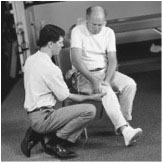
2. Knee Extension: Seated Stretch
The knee extension/seated stretch is performed while seated at the edge of a chair. Gently slide your surgical leg forward and push down on the knee to straighten your leg. Hold for 10-15 seconds then pull your leg back. Repeat the recommended number of times.
ALL EXERCISES SHOULD BE PERFORMED AS INSTRUCTED BY YOUR SURGEON, AFTER PROPER DEMONSTRATION BY A PHYSICAL THERAPIST.
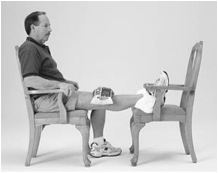
3. Knee Extension: Passive
Prop foot of operated leg up on chair. Place towel roll under ankle and ice pack over knee. Put 5-10 lbs. of weight on top of knee (a 5-10 lb. bag of rice works well). Do this for the recommended amount of time.
ALL EXERCISES SHOULD BE PERFORMED AS INSTRUCTED BY YOUR SURGEON, AFTER PROPER DEMONSTRATION BY A PHYSICAL THERAPIST.
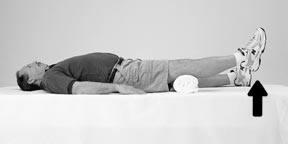
4. Knee Extension: Straight Leg
Lie on back, place towel roll under thigh. Lift foot, straightening knee. Do not raise thigh off roll. Repeat the recommended number of times.
ALL EXERCISES SHOULD BE PERFORMED AS INSTRUCTED BY YOUR SURGEON, AFTER PROPER DEMONSTRATION BY A PHYSICAL THERAPIST.
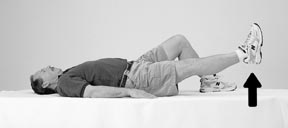
5. Straight Leg Raise
The straight leg raise is performed in a reclined position, using your forearms to support your upper body. While keeping your leg straight, lift your leg twelve to twenty inches, hold for a count of ten, and slowly lower your leg back to the floor. Relax. Repeat the recommended number of times.
ALL EXERCISES SHOULD BE PERFORMED AS INSTRUCTED BY YOUR SURGEON, AFTER PROPER DEMONSTRATION BY A PHYSICAL THERAPIST.
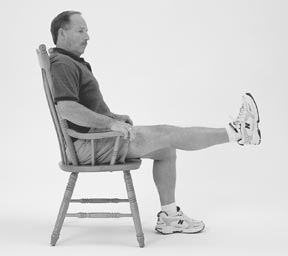
6. Sitting Knee Extensions
Sit with your back against the chair. Straighten knee. Repeat the recommended number of times.
ALL EXERCISES SHOULD BE PERFORMED AS INSTRUCTED BY YOUR SURGEON, AFTER PROPER DEMONSTRATION BY A PHYSICAL THERAPIST.
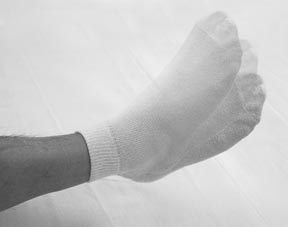
7. Ankle Pump
The ankle pump is performed by slowly moving your foot back and forth as far as possible. Repeat the recommended number of times.
ALL EXERCISES SHOULD BE PERFORMED AS INSTRUCTED BY YOUR SURGEON, AFTER PROPER DEMONSTRATION BY A PHYSICAL THERAPIST.
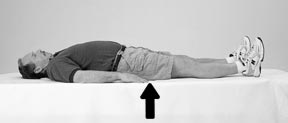
8. Quadriceps/Gluteal Exercise
The quadriceps/gluteal exercise is performed while lying on your back. Tighten the tops of your legs while squeezing your buttocks and hold for a count of ten. Do not hold your breath. Repeat the recommended number of times.
ALL EXERCISES SHOULD BE PERFORMED AS INSTRUCTED BY YOUR SURGEON, AFTER PROPER DEMONSTRATION BY A PHYSICAL THERAPIST.
All patient education materials are provided by OrthoPatientEd.com and have been reviewed by our Advisory Board of leading Orthopedic Surgeons to ensure accuracy. All materials are provided for informational purposes only and are not intended to be a substitute for medical advice from your orthopedic surgeon. Any medical decisions should be made after consulting a qualified physician.
This site includes links to other websites. OrthoPatientEd.com takes no responsibility for the content or information contained in the linked sites.
